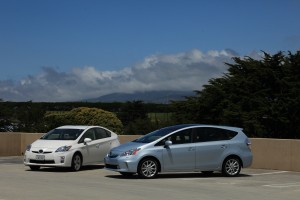The Green Car Trophy: Did Hybrids Cheat to Win?
Whether you sincerely care about the environment or not you have probably heard about the Toyota Prius. As the icon of ‘green cars,’ the Prius provides spectacular fuel economy and most importantly, outputs less environmentally harmful carbon emissions. The Prius is able to achieve these feats because of its innovative hybrid drive-train, which combines a small gasoline engine with an electric motor. The electric motor generally powers the vehicle using a large battery pack at slow speeds, while the gasoline engine kicks in at higher speeds or whenever power is needed.
Sure, as test figures reveal, the Prius indeed uses less gasoline when being driven, but do the Prius and similar hybrid electric vehicles really reduce the negative impact on our environment? Delving into the manufacturing process of hybrid vehicles will surely make you think otherwise.
Research suggests that the manufacturing process of a Prius contributes more negatively to the environment than driving several gas guzzling sport-utility vehicles, for a distance triple its lifetime mileage ever could. The culprit which taints the Prius’ beloved reputation is its main component, the battery. The amount of effort required to make this Nickel-based battery is absolutely staggering.
A hybrid car’s battery production starts with mining and smelting nickel. The factories which carry out this process are dangerously damaging to the environment. They let out copious amounts of Sulphur Dioxide, the major cause of acid rain. Energy coordinator David Martin of Canadian Greenpeace spoke about the impact of such a factory on its city saying, “The acid rain around Sudbury was so bad it destroyed all the plants and the soil slid down off the hillside”.
‘each container ship is as polluting as fifty million cars combined’
The next process required to create the battery is refining of the nickel, which is done in a select few specialized places across the globe. As a result the nickel must be transported to this specialized location. Ensuing refinement, the nickel must then be transported again to another place for further modifications to be able to incorporate it into the battery. Finally, it must be shipped back to the manufacturer for assembly. In the Prius’ case, the nickel must be shipped from Canada, to Europe, China, and back to Japan. All this shipping is no simple task. It requires the use of massive container ships. Regarding these container ships, a study by the Danish government’s environmental agency revealed that each container ship is as polluting as fifty million cars combined.
The issues discussed so far are only about 75% of the problem. As with other batteries, the batteries used in hybrid cars have the inherent flaw of a limited lifetime. After this lifetime, the cars will become impractical to use. At this stage, the batteries will require special attention for disposal, as they contain environmentally harmful electrolytes.
It can be attracting for consumers to buy into hybrid electric vehicles, given they are at the pinnacle of fuel efficiency. However, consumers need to ask themselves whether the environmental impact of manufacturing and disposing of the batteries in hybrid cars is outweighed by the lower lifetime carbon emissions produced by driving the vehicle itself.
Until science figures out eco-friendly manufacturing processes, we should probably focus on carpooling, using public transport, and other alternatives to hybrid vehicles!

October 15th, 2011 at 10:08 am
I really like the critical look you have presented on hybrid cars. It is so important to think about the entire life cycle of a product when determining how sustainable (or unsustainable) it is. Cradle-to-cradle design (such as this company) is where we need to eventually get.